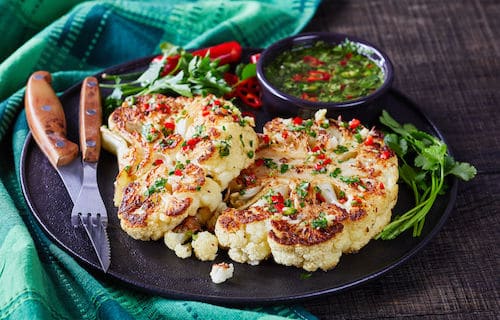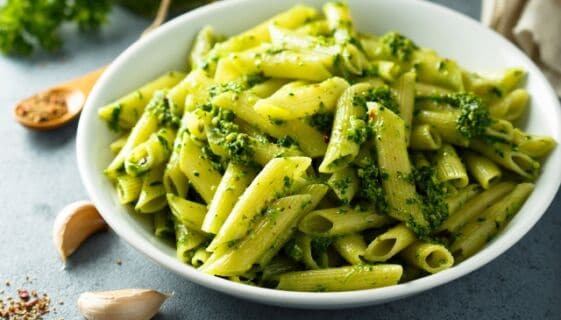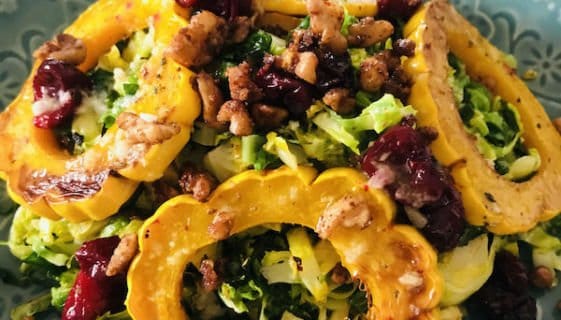Do you love mashed potatoes? I definitely do!
At times, I want the feeling of eating mashed potatoes, but desire a lightness that is sometimes lacking—enter cauliflower mash. To highlight a couple wonderful elements of cauliflower compared to potatoes, you can’t over-mash or over-whip cauliflower the way you can potatoes.
Without potato’s starch to contend with, you can purée the cauliflower all day with no risk of gumminess. And then there’s the taste: Mashed cauliflower has an earthy, nutty flavor, which means it offers some complexity to the final dish. The cauliflower mash is so light and fluffy, and the mushroom chickpea gravy is the hearty, flavorful component that melds it all together. This is a dish to keep you warm and satisfy all your taste buds. Winter is in full force and I’m sure you’re all starting to feel it. At this time of year, with the nights longer and days shorter, your body, understandably, needs an extra bit of support.
Your immune system, circulatory system, and digestive system all need a helping hand at this time of year—and this recipe is packed full of essential nutrients (Vitamin C, Zinc, Vitamin B12, Omega-3s, Vitamin E), along with gut supporting properties to increase serotonin production (the happy hormone) to help keep you in good health and spirits through the winter months.
Cauliflower Mash
Ingredients
- 2 medium heads of cauliflower, finely chopped
- 6 oz plain yogurt (dairy or non-dairy)
- 1/4 cup milk or non-dairy milk
- 1 Tbsp olive oil, or coconut oil
- Salt to taste
- Black pepper to taste
- Chives for garnish
Directions
- Bring a large pot of water to a boil.
- Add cauliflower and cook until tender, approximately 10 minutes. Drain well, and reserve 1/4 cup of cooking liquid.
- Return to pot and add oil, mash cauliflower with a potato masher or put in a food processor and pulse until no large chunks remain.
- Stir in yogurt and milk.
- Season to taste. Garnish with chives.
Mushroom Chickpea Gravy
Ingredients
- 2 Tbsp olive oil
- 1 cup onion, diced
- 2 garlic cloves, minced
- 3 cups mushrooms, sliced
- 2 Tbsp flour (wheat, rice, oat, or spelt)
- 2 cups vegetable or chicken broth
- 1 tsp Italian seasoning
- 1 can chickpeas, drained and rinsed
- 3 cups leafy greens, packed
- Salt and pepper to taste
Directions
- Place the onion and garlic in a large skillet or sauté pan over medium heat. Cover and cook until softened, about 5 minutes.
- Add the mushrooms and cook, covered, for 5 minutes more, or until the mushrooms begin to release their juices.
- Add the flour and stir to coat. Pour in the vegetable broth, then add the Italian seasoning and chickpeas. Bring to a boil, reduce the heat to medium and simmer, uncovered, for about 10 minutes, until the broth begins to thicken.
- Add the leafy greens and stir to wilt. Reduce the heat to low and simmer, stirring occasionally, for 5 more minutes.
- Add salt and pepper to taste and serve over cauliflower mash, meats, vegetables, etc.
Cauliflower: A member of the Cruciferous family of vegetables, cauliflower provides a good source of dietary fiber, thiamin, riboflavin, pantothenic acid, niacin, Vitamin B-6, Vitamin C, and Vitamin K. Cauliflower is also rich in anti-inflammatory properties from phytochemicals (carotenoids, polyphenols, flavonoids, and ascorbic acid), and gut health promoting properties, due to it being a prebiotic (food for our good gut bacteria). This is one of the most nutrient-dense foods, with only 25 calories per cup, and packed full of immune and health supporting vitamins and minerals.
Chives: The allyl sulfides in chives have been shown to ease digestive discomfort. Chives have strong antibacterial qualities, and can increase the nutrient uptake efficiency of our gut. Current research suggests that the significant concentration of diallyl trisulphides in chives can act as a potential anticancer agent.
Garlic and Onions: These vegetables are considered pre-biotics, meaning they feed the “good” bacteria in our gut and promote a healthy digestive system. Research supports that compounds such as allicin in garlic and onions have antioxidant, anti-inflammatory, antimicrobial, and cardio-protective properties.
Mushrooms: Make sure to cook your mushrooms in increase digestibility and release nutrients that are stored in their thick cellular walls. Mushrooms are very good source of dietary fiber (beta glucan), and one of the only foods that is able to store vitamin D when exposed to the sun. They contain anti-inflammatory properties, and are rich in minerals such as selenium (an antioxidant).
Chickpeas: Areas around the world that have been identified as places where humans live the longest (Blue Zones), are places where chickpeas are commonly found in the diet. These versatile and affordable beans contain folate, fiber, iron, phosphorus and healthy fats. Their high amounts of soluble fiber and plant sterol support a healthy gut microbiome. Chickpeas increase feelings of satiety and have been associated with a decreased risk of heart disease.
Olive Oil: A rich source of monounsaturated fats, olive oil contains antioxidants and omega-3 fatty acids that exhibit anti-inflammatory effects. Olive oil also promotes gut health, due to its antibacterial properties.
Yogurt: Contains probiotics and “good bacteria”. Probiotics can help promote a healthy balance of gut bacteria and have been linked to a range of health benefits including: Aiding in digestive health, immune function, weight loss, and preventing and treating diarrhea.
Leafy Greens: Researchers of the “Mind Diet” found that individuals who consume leafy greens regularly (1.3 servings per day) were the equivalent of 11 years younger than individuals that consumed leafy greens only on occasion. Greens such as kale, spinach, collards, mustard greens, arugula, and chard are have been shown to protect bones from osteoporosis, prevent against inflammatory diseases, support a healthy gut, strengthen the immune system, and supply a high amount of antioxidants. They are considered to be among the best cancer-preventing foods.



 Ananda Kaplan
Ananda Kaplan


